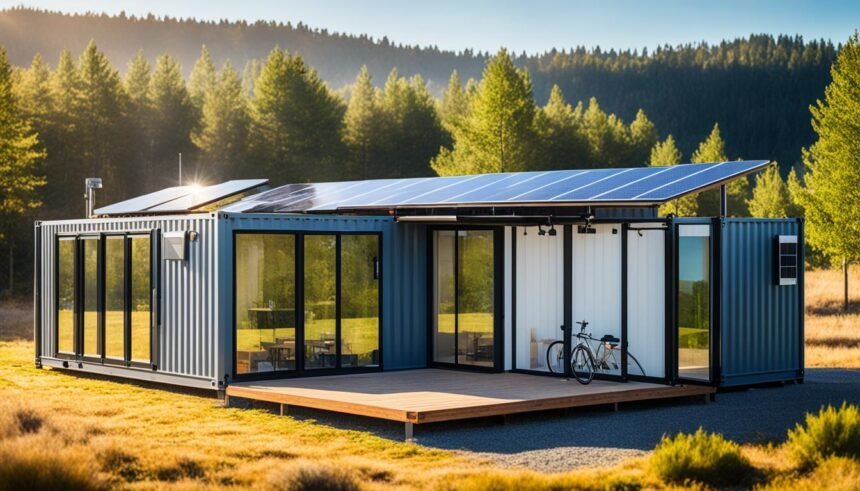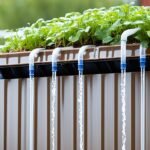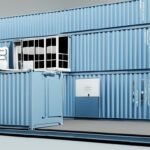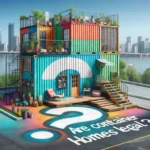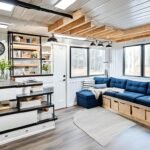If you’re looking for sustainable living options for your container home, solar power systems are a great choice. These systems provide off-grid energy solutions, making your home eco-friendly and reducing your reliance on traditional electricity sources. With the right solar panel installation, you can enjoy renewable energy in your compact living space.
Key Takeaways:
- Solar power systems offer sustainable, off-grid energy solutions for container homes.
- These systems help reduce reliance on traditional electricity sources.
- Proper solar panel installation enables the use of renewable energy in compact living spaces.
- Implementing solar power systems contributes to eco-friendly living.
- Enjoy long-term cost savings with efficient solar power solutions for your container home.
Benefits of Solar Power Systems for Container Homes
Solar power systems offer numerous benefits for container homes. Firstly, they allow you to embrace sustainable living options, reducing your carbon footprint and contributing to a cleaner environment. By harnessing the power of the sun, these systems provide renewable energy for small spaces, making them ideal for compact living situations like container homes.
“Solar power systems are shaping the future of energy-efficient solutions for compact living.”
Not only are solar power systems environmentally friendly, but they also offer energy-efficient solutions for compact living. With advanced technology and efficient design, these systems convert sunlight into electricity, allowing you to power your appliances and devices while minimizing your dependence on traditional electricity sources.
Benefits at a glance:
- Sustainable living options: Reducing carbon footprint, contributing to a cleaner environment
- Renewable energy for small spaces: Ideal for compact living situations like container homes
- Energy-efficient solutions for compact living: Minimizing reliance on traditional electricity sources
By installing a solar power system, you can enjoy the benefits of renewable energy, reduce your energy costs, and create a more sustainable and eco-friendly living space.
Components of Solar Power Systems for Container Homes
A solar power system for a container home typically includes several components. These components work together to generate, store, and distribute solar energy, providing an efficient and sustainable power source for your home.
- Solar Panels: Solar panels are the key component of a solar power system. They are installed on the roof or other suitable areas of the container to capture sunlight and convert it into electricity. These panels are made up of photovoltaic cells that absorb sunlight and generate direct current (DC) electricity.
- Deep Cycle Batteries: Deep cycle batteries store the excess electricity generated by the solar panels. This stored energy can be used during periods of low sunlight or at night when the panels are not producing electricity. The batteries are designed to withstand frequent charging and discharging cycles, making them ideal for solar power systems.
- Power Inverters: Power inverters convert the DC electricity generated by the solar panels and stored in the batteries into alternating current (AC) electricity, which is the type of electricity used in most household appliances and devices. This allows you to power your appliances and devices directly from the solar power system.
- Charge Controllers: Charge controllers regulate the charging and discharging of the batteries. They prevent overcharging of the batteries and ensure that the energy generated by the solar panels is efficiently stored in the batteries. Charge controllers also protect the batteries from damage due to excessive discharge.
These components work together seamlessly to provide a reliable and sustainable power supply for your container home. By harnessing the power of the sun, you can reduce your reliance on traditional electricity sources and enjoy the benefits of clean, renewable energy.
Plug-n-Play Installation for Easy Setup
Solar power systems for container homes often feature plug-n-play installation, making it easy for homeowners to set up and start using the system. With this type of installation, all the necessary components are pre-wired and ready to be connected. This eliminates the need for complex wiring or hiring professional installers, saving you time and money.
One of the key advantages of plug-n-play installation is its simplicity. Homeowners can easily connect the solar panels, batteries, power inverters, and other components without extensive technical knowledge or the need for specialized tools. The plug-and-play design ensures a hassle-free setup process, allowing you to quickly start harnessing solar energy for your container home.
The Benefits of Plug-n-Play Installation:
- Convenience: The pre-wired components make the installation process straightforward, eliminating the need for complicated wiring diagrams or configurations. This convenience allows you to have your solar power system up and running in no time.
- Cost savings: With plug-n-play installation, you can save money by avoiding the expense of hiring professional installers. Additionally, the simplified setup process reduces the chances of errors or problems, minimizing the need for costly repairs or adjustments.
- Flexibility: The modular design of plug-n-play solar power systems offers flexibility in scaling up or expanding your system in the future. You can easily add more solar panels or batteries as your energy needs grow, without major modifications or disruptions.
Plug-n-play installation for solar power systems is a game-changer for container homeowners. The simplicity and convenience of connecting pre-wired components ensure a hassle-free setup process, providing you with immediate access to clean and renewable energy. Whether you’re a DIY enthusiast or looking for a cost-effective and efficient installation option, plug-n-play systems offer the perfect solution for easy and hassle-free energy independence.
With plug-n-play installation, enjoying the benefits of solar power for your container home has never been easier. Whether you’re looking to reduce your carbon footprint, save on electricity bills, or enhance your off-grid living experience, these systems make it accessible to everyone.
Power Output and Capacity
The power output and capacity of a solar power system for a container home depend on the specific components used. When choosing a system, it is important to consider your energy needs and the available sunlight in your location.
Most solar power systems for container homes offer a range of power outputs, typically measured in watts. The power output refers to the amount of electricity the system can generate at its peak performance. Having a higher power output means that the system can provide more electricity to power your appliances and devices.
The capacity of the system, including the battery storage capacity, determines how much energy can be stored and used over time. The battery storage capacity is especially crucial for off-grid container homes, as it allows you to store excess energy generated during the day for use during nighttime or when there is limited sunlight.
When considering the power output and capacity of a solar power system for your container home, it is essential to determine your energy needs. Evaluate the appliances and devices you plan to power and calculate their energy consumption. This will help you determine the appropriate power output and capacity required for your system.

Optional Upgrades for Enhanced Functionality
Take your solar power system for your container home to the next level by exploring optional upgrades that can enhance its functionality. These upgrades allow you to customize your system based on your specific needs and preferences, creating a truly personalized and high-performing energy solution. Here are some popular optional upgrades to consider:
- Automatic Transfer Switches: Upgrade your system with automatic transfer switches for seamless power transfer between the solar power system and the main grid. This ensures uninterrupted power supply even during grid outages.
- Additional Power Inverters or Batteries: Scale up your system’s capacity by adding extra power inverters or batteries. This enables you to generate and store more electricity, accommodating higher energy demands.
- Sun Trackers: Enhance the efficiency of your solar panels with sun trackers. These devices automatically adjust the orientation of the panels to maximize sunlight absorption throughout the day, optimizing energy production.
- Wi-Fi Hotspots: Stay connected while enjoying off-grid living by adding Wi-Fi hotspots to your solar power system. This allows you to access the internet, connect your devices, and enjoy online services in your container home.
- Surveillance Systems: Enhance security by integrating surveillance systems into your solar power setup. Monitor your property remotely using cameras powered by your solar energy system, providing peace of mind and added safety.
- Outdoor Lights: Illuminate your exterior space with solar-powered outdoor lights. These lights not only enhance the aesthetics of your container home but also provide safety and visibility during the night.
Selecting the right optional upgrades for your solar power system can significantly enhance its functionality, ensuring optimal performance and meeting all your energy needs. Consult with solar power system experts to determine which upgrades suit your requirements best and help you create a customized solution.
Low-Maintenance and Long-lasting
Solar power systems for container homes are designed to be low-maintenance and long-lasting. The use of durable materials in solar panel construction ensures their ability to withstand various weather conditions without damage. This longevity reduces the need for frequent replacements, making them a cost-effective solution in the long run.
The low-maintenance aspect of solar power systems is an added advantage for container homeowners. With minimal cleaning required, maintaining the panels becomes hassle-free. This ease of upkeep allows homeowners to focus on enjoying the benefits of their solar system without having to spend significant time or resources on maintenance tasks.
The batteries used in these systems are often maintenance-free as well. They are designed to sustain their performance levels for several years without the need for major repairs or replacements. This reliability and longevity ensure that container homeowners can benefit from uninterrupted, clean energy without the added burden of regular battery maintenance.
The Environmental Impact
“Investing in long-lasting solar power systems for container homes not only provides energy independence but also reduces carbon emissions, contributing to a sustainable future.”
By choosing a low-maintenance and long-lasting solar power system for their container home, homeowners can make a significant environmental impact. The reduced maintenance requirements mean fewer resources are needed for the upkeep of the system, resulting in a smaller ecological footprint.
Additionally, the longevity of solar power systems helps reduce the amount of e-waste generated. Traditional energy sources, such as fossil fuels, produce significant waste in the form of emissions and by-products. By opting for solar power, container homeowners can actively contribute to the reduction of harmful waste and promote a cleaner, healthier environment.
| Advantages of Low-Maintenance and Long-Lasting Solar Power Systems for Container Homes |
|---|
| Minimal cleaning and upkeep required |
| Long-lasting performance without frequent replacements |
| Reduction in e-waste generation |
| Contribution to a sustainable future |
Investing in Durability and Efficiency
Opting for low-maintenance and long-lasting solar power systems for container homes not only saves homeowners time and money in the long term but also contributes to a greener, more sustainable future. These systems provide a reliable and efficient source of renewable energy, allowing container homeowners to enjoy their compact living spaces without compromising comfort or convenience.
As the demand for sustainable housing solutions continues to rise, investing in solar power systems for container homes becomes an increasingly practical and eco-friendly choice. By harnessing the power of the sun, container homeowners can reduce their reliance on traditional electricity sources and embrace a more self-sufficient, off-grid lifestyle.
Warranty and Customer Support
When investing in a solar power system for your container home, it’s important to consider the warranty and customer support provided by the manufacturer. A reliable warranty offers peace of mind and protection against any potential issues or defects that may arise with the system. Additionally, having access to reliable customer support ensures that you can address any questions or concerns you may have during the installation and operation of the system.
Look for a solar power system that comes with a comprehensive warranty, covering both the solar panels and other essential components. This warranty should include a specified period of coverage, typically ranging from 5 to 25 years, depending on the manufacturer and system type. Make sure to read the warranty terms and conditions carefully to understand what is covered and any limitations or exclusions that may apply.
In addition to a warranty, choose a reputable manufacturer that offers reliable customer support. Prompt and efficient customer support can assist you in troubleshooting and resolving any technical issues that may arise with your solar power system. This support can range from phone or email assistance to on-site visits, depending on the manufacturer’s policies and the complexity of the issue.
By considering both warranty coverage and customer support when selecting a solar power system for your container home, you can ensure a positive and hassle-free experience with your renewable energy investment.
Energy Consumption of Common Appliances
When designing a solar power system for your container home, it is crucial to consider the power consumption of common appliances. The power requirements of different appliances can impact the size of the solar panel installation and battery capacity needed to meet your energy needs. By understanding the energy requirements of your appliances, you can determine the appropriate capacity for your solar power system and ensure efficient energy usage.
Power Consumption Comparison
Here is a comparison of the power consumption of common household appliances:
| Appliance | Power Consumption (Watts) |
|---|---|
| Light Bulbs (LED) | 4-15 |
| Television | 50-400 |
| Refrigerator | 100-800 |
| Washing Machine | 300-2500 |
| Air Conditioner (8000 BTU) | 700-1000 |
| Clothes Dryer | 1800-5000 |
Please note that these power consumption values are approximate and may vary depending on the specific make and model of the appliance. It is recommended to refer to the manufacturer’s specifications for accurate power consumption information.
By considering the power consumption of your appliances, you can determine the size of your solar power system and the number of solar panels and batteries needed for optimal performance.

Container Home Specifications
When designing a solar power system for a container home, it is important to consider the specific specifications unique to these living spaces. These specifications play a crucial role in determining the size and layout of the solar panel installation, ensuring optimal performance and functionality. Key container home specifications to take into account include:
- Container Size: The dimensions of the container will impact the available space for solar panel installation. It is essential to measure the length, width, and height of the container to determine the maximum size and number of solar panels that can be accommodated.
- Roof or Exterior Space: Container homes may have limited roof space for solar panel placement. In such cases, it is important to explore alternative options, such as mounting panels on the exterior walls or utilizing ground-mounted systems.
- Electrical Connection Requirements: Ensure there is proper access to electrical connections within the container. This includes assessing the existing wiring infrastructure and identifying any additional requirements for integrating the solar power system into the electrical setup.
Working with a professional solar power system installer is highly recommended when designing and installing a system for a container home. They can assess the specific container home specifications and provide expert guidance on the most suitable solar panel layout and setup for optimal energy generation.
| Specification | Description |
|---|---|
| Container Size | Measure the length, width, and height of the container to determine the available space for solar panel installation. |
| Roof or Exterior Space | Assess the roof or exterior walls of the container to determine the available space for solar panel placement. |
| Electrical Connection Requirements | Identify the existing electrical connections within the container and any additional requirements for integrating the solar power system. |
By considering the container home specifications and collaborating with professionals, you can ensure that the solar power system is tailored to your specific container home requirements, maximizing energy generation and efficiency.
Versatility and Customizability of Container Homes
Container homes are highly versatile and customizable, allowing homeowners to adapt the space to their specific needs and preferences. Whether you’re seeking a minimalist design or a more luxurious layout, container homes offer endless possibilities for creating a unique living environment.
One of the key advantages of container homes is their ability to be easily modified and expanded. With traditional homes, adding extra rooms or altering the layout can be an expensive and time-consuming process. However, with container homes, you can easily connect multiple containers or remove walls to create an open floor plan.
Furthermore, container homes can be designed to blend seamlessly with any architectural style. Whether you prefer a modern, industrial look or a more traditional aesthetic, containers can be transformed to match your desired design. From rustic cabins to sleek urban dwellings, the possibilities are endless.
“I love how versatile container homes are. The ability to customize every aspect of the living space allows me to create a home that perfectly fits my lifestyle and personality.”
– Jane Smith, Container Home Owner
When it comes to integrating sustainable features, container homes are a prime choice. Solar power systems can be easily integrated into the container design, providing the necessary energy for lighting, appliances, and other electrical needs. This allows homeowners to live off-grid and reduce their carbon footprint.
Moreover, container homes can be adapted for various purposes beyond residential living. They can be transformed into offices, retail spaces, workshops, or even vacation retreats. This versatility makes container homes an attractive option for entrepreneurs and individuals looking for unique and affordable spaces.
Benefits of Versatile Home Design:
- Flexibility: Container homes can be easily modified and expanded to suit changing needs.
- Cost-effectiveness: Customizing a container home is often more affordable compared to traditional home renovations.
- Sustainable living: By incorporating eco-friendly features like solar power systems, container homes offer sustainable living solutions.
- Unique style: Container homes provide an opportunity to create a distinctive living space that reflects your personal style.
- Adaptability: Containers can be repurposed for various uses, making them ideal for individuals seeking versatile spaces.
In conclusion, container homes offer a versatile and customizable housing option that combines sustainability with style. By embracing the possibilities of container design and incorporating features like solar power systems, homeowners can create a living space that is truly unique, environmentally friendly, and perfectly tailored to their needs.
Conclusion
Solar power systems offer a sustainable and efficient energy solution for container homes. By harnessing the power of the sun, these systems provide off-grid energy, reducing reliance on traditional electricity sources and minimizing carbon footprint. The long-term cost savings associated with solar power make it an attractive option for homeowners.
One of the key advantages of solar power systems for container homes is the plug-n-play installation, which allows for easy setup and reduces the need for complex wiring or professional installers. Additionally, these systems offer customizable options to meet the specific needs and preferences of homeowners.
Solar power systems for container homes are designed to be low-maintenance and long-lasting. The durable solar panels can withstand various weather conditions and require minimal cleaning and maintenance. The batteries used in these systems are often maintenance-free and built to last for years without major maintenance or replacement needs.
In conclusion, solar power systems provide an eco-friendly and practical energy solution for container homes. With their sustainable features, easy installation, and low-maintenance design, these systems allow homeowners to embrace a greener lifestyle while enjoying the benefits of renewable energy.
FAQ
What are the benefits of using solar power systems for container homes?
Solar power systems offer sustainable living options, renewable energy for small spaces, and energy-efficient solutions for compact living.
What components are included in a solar power system for a container home?
Components typically include solar panels, deep cycle batteries, power inverters, and charge controllers.
How easy is it to install a solar power system for a container home?
Solar power systems for container homes often feature plug-n-play installation, making it easy for homeowners to set up and start using the system.
What is the power output and capacity of a solar power system for a container home?
The power output and capacity will depend on the specific components used and is typically measured in watts.
Can solar power systems for container homes be upgraded?
Yes, optional upgrades such as automatic transfer switches, additional power inverters or batteries, and other features are available to enhance functionality.
Are solar power systems for container homes low-maintenance?
Yes, these systems are designed to be low-maintenance and the solar panels require minimal cleaning and maintenance.
What warranty and customer support should I look for in a solar power system for a container home?
It is important to consider the warranty and reliable customer support provided by the manufacturer when choosing a solar power system.
How do I determine the appropriate capacity of a solar power system for my container home?
Understanding the energy consumption of your common appliances will help determine the appropriate capacity for your solar power system.
What container home specifications should be considered when designing a solar power system?
Size of the container, available roof or exterior space for solar panel installation, and electrical connection requirements should be taken into account.
Can solar power systems be integrated seamlessly into the design of container homes?
Yes, solar power systems can be customized and integrated into the design of container homes for all electrical needs.

